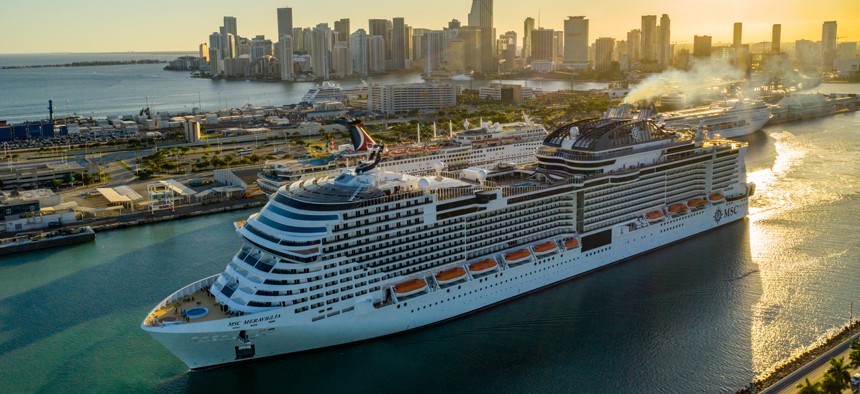Federal Court Lifts CDC Cruise Ship Restrictions

istockphoto.com/felixmizioznikov
The order reverses an earlier decision that allowed the restrictions to remain in place. The ruling affects only ships sailing in and out of Florida.
A federal appeals court on Friday sided with the state of Florida, temporarily blocking the Centers for Disease Control and Prevention from placing restrictions on cruise ships during the ongoing Covid-19 pandemic in a reversal of an earlier decision.
The order, issued by a three-judge panel from the 11th U.S. Circuit Court of Appeals, vacated its earlier ruling that allowed the CDC restrictions to remain in place. The judges did not explain the reason for the flip, writing only that the CDC “failed to demonstrate an entitlement to a stay pending appeal.”
The ruling is the latest development in a lawsuit filed in April by Florida against the CDC, alleging that the federal agency’s restrictions on cruise ships amounted to an unlawful shutdown of a vital tourism driver.
“We must allow our cruise liners and their employees to get back to work and safely set sail again,” Gov. Ron DeSantis said in a statement. “To be clear, no federal law authorizes the CDC to indefinitely impose a nationwide shutdown of an entire industry. This lawsuit is necessary to protect Floridians from the federal government’s overreach and resulting economic harm to our state.”
The CDC paused cruise ships in March 2020 with a no-sail order, which shifted to a “conditional sailing order” in October. That updated guidance recommended a phased approach to regular cruising, which required ship operators to run “trial voyages” and meet certain benchmarks before resuming normal operations with restricted passenger capacities.
Cruise lines operating ships where at least 95% of passengers and crew are vaccinated can move through that process more quickly, though updated guidance from the CDC recommends that all passengers, regardless of vaccination status, wear masks on board.
A district judge in June ruled in favor of Florida, saying the CDC’s restrictions amount to an overreach that could lead to the “increasingly threatening and imminent prospect that the cruise industry will depart the state.”
Attorneys from the federal Department of Justice appealed the ruling and also requested that the restrictions remain in place until a final decision was made. In court filings, attorneys for the CDC noted that cruise travel “has the potential to introduce Covid-19 variants of concern into the United States from countries such as the Bahamas, Mexico, Honduras, Saint Maarten, Dominican Republic, Haiti, Aruba, and Saint Kitts and Nevis.”
“The CDC has authority to make and enforce such regulations as in its judgment are necessary to prevent the introduction, transmission, or spread of communicable disease from a foreign country into the United States,” they wrote.
The three-judge panel initially sided with the CDC and granted the stay, but reversed itself on Friday.
Earlier that day, Florida Attorney General Ashley Moody had appealed to the Supreme Court for an emergency intervention in the case, saying that the CDC’s regulations are comprised of an “ever-changing array of requirements” that are updated often and without adequate notice. Many of those rules, she said, are impractical for cruise lines, requiring passengers to “comply with social-distancing requirements throughout ships, including in outdoor areas like swimming pools and while waiting in line for the bathroom.”
The restrictions, she said, have “already cost the state tens of millions of dollars in tax and port revenue and unemployment payments to separated cruise-industry employees. It will continue to do so until all ships are able to sail free from the CDC’s mandates.”
Friday’s ruling applies only to ships sailing to and from Florida. The underlying appeal from the Justice Department will proceed through the court system.
DeSantis praised the order, saying in a statement that “the importance of this case extends beyond the cruise industry.”
“From here on out a federal bureau will be on thin legal and constitutional ice if and when it attempts to exercise such sweeping authority that is not explicitly delineated by law,” he said.
The CDC told Reuters that the conditional sail order will be considered voluntary as long as the ruling stands, but that the agency would continue to enforce its mask mandate on vessels regardless of whether they choose to comply with other restrictions.
Ships that do not follow the order must also continue “reporting of individual cases of illness or death and ship inspections and sanitary measures to prevent the introduction, transmission, or spread of communicable diseases," the agency said.
Kate Elizabeth Queram is a senior reporter for Route Fifty and is based in Washington, D.C.
NEXT STORY: 50% of Americans Think Gun Violence is a ‘Very Big Problem’





